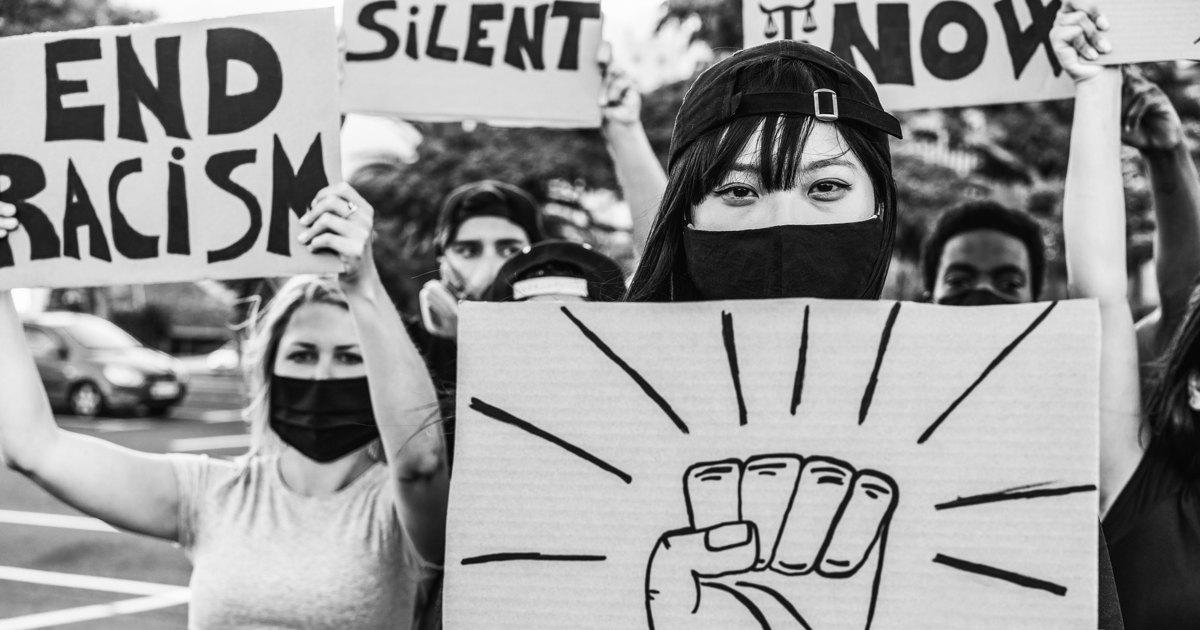
May 5, 2023 4:10:41 PM
Almost 30 years ago at the University of California, San Diego, the late Chicana feminist and activist Elizabeth Martinez coined the term Oppression Olympics during a discussion with Angela Davis about the importance of building cross-racial coalitions for social justice.
Martinez used this term to describe how different racial groups within the Black, Indigenous, and People of Color (BIPOC) community compete with each other to see which one has been most negatively impacted by white supremacy.
Related: Punk Artist Mike Park Shares His Experience with Anti-Asian Hate
This competition stems from the fear that when the focus shifts to a specific group’s fight for liberation and justice, it decenters other groups’ struggles for racial justice.
For AAPI Heritage Month, let’s look at how the AAPI community has worked across racial and ethnic boundaries to break ground and hold hands in the fight for justice.
Throughout the course of United States history, Asian Americans and Pacific Islanders (AAPI) have always engaged in cross-racial solidarity movements in the fight for liberation and justice. The Third World Liberation Front formed by student activists at both San Francisco State College and the University of California, Berkeley, in the late 1960s, may be the greatest evidence of this work, as it featured students from the Asian American Political Alliance, the Mexican-American Student Confederation, and the African-American Studies Union.
Through this multi-ethnic coalition, the students were successful in launching the formation of the nation’s first college of Ethnic Studies at San Francisco State University, as well as the creation of an Ethnic Studies department at the University of California, Berkeley.
The Yellow Power movement formed coalitions with Black, Indigenous, and other non-Asian American groups in their efforts to advocate for the civil rights of all Asian Americans. Richard Aoki, who was Japanese American and one of the co-founders of the Asian American Political Alliance, was a founding member of the original Black Panther Party, which was formed in Oakland, California, in 1966.
Haunani-Kay Trask, a revolutionary figure and leader of the Hawaiian sovereignty movement, was a vocal supporter of the Black Panther Party during her time as an undergraduate student at the University of Chicago.
Around the time of the Vietnam War, peace activist Thích Nhất Hạnh developed a strong friendship with Dr. Martin Luther King, Jr., whom he educated about the parallels between the nonviolent struggles of Vietnamese buddhists and the civil rights movement in the Jim Crow South. This perspective propelled King to become a more outspoken opponent of the Vietnam War and a stronger ally of the Vietnamese people.
With regard to their coalition building with Native communities, Asian American activists from San Francisco and Los Angeles stood in solidarity with the American Indian Movement during its occupations of Alcatraz and Wounded Knee in 1969 and 1973, respectively.
Even today, we have several Asian-American-led organizations and movements carrying on the long-standing tradition of intra-racial and cross-racial coalition work. While it’s impossible to highlight all of the organizations and movements that are at the forefront of this work, I still would like to provide you with a short list to review.
Ultimately, the long history of cross-racial coalition building between Asian Americans, Pacific Islanders, and other historically marginalized communities largely outweighs any divisions that exist between them.
Therefore, engaging in the Oppression Olympics doesn't do us any good and perpetuates harm within the BIPOC community. Although each group’s relationship with racial oppression is different, white supremacy serves as the common denominator for all the groups. For this reason, coalition building is not only key to eliminating the model minority myth but also to elevating the struggles of other groups within the BIPOC community.
For those of you who have followed me, you already know that Black liberation will always be central to everything I do as an educator.
I also know that the specific causes I fight for in my own pursuit of liberation and justice will not be elevated any further without cross-racial solidarity and coalition building.
That should be the greatest lesson we gain from the history of Asian American and Pacific Islander liberation movements.
Furthermore, this is a critical lesson that should go beyond AANHPI Heritage Month and be applied to our current sociopolitical context. This documented history provides us with a blueprint for what we need to accomplish and what is possible when we decide, as a collective, to ball up our individual fingers and thumbs into one mighty powerful fist.
Kwame Sarfo-Mensah is the founder of Identity Talk Consulting, a global educational consulting firm that specializes in developing K-12 teachers into identity-affirming educators. Throughout his 17-year career as a classroom teacher, author, and consultant, Kwame has earned numerous accolades for this work, which include being honored as the 2019 National Member of the Year by Black Educators Rock, Inc. and being recognized as a Top Education Influencer by brightbeam, Inc. in 2021 and 2022. His newest book, "Learning to Relearn: Supporting Identity in a Culturally Affirming Classroom", is out now.
Few issues in education spark more tension and debate than standardized testing. Are they a tool for equity or a burden on students? A necessary check on school systems or a flawed measure of...
Charter schools are public schools with a purpose. Operating independently from traditional school districts, they're tuition-free, open to all students, and publicly funded—but with more flexibility...
Despite the benefits of a diverse teaching force, prospective teachers of color fall out of our leaky preparation pipeline at every stage: preparation, hiring, induction, and retention. Here’s what...
Ed Post is the flagship website platform of brightbeam, a 501(c3) network of education activists and influencers demanding a better education and a brighter future for every child.
© 2020-2025 brightbeam. All rights reserved.
Leave a Comment